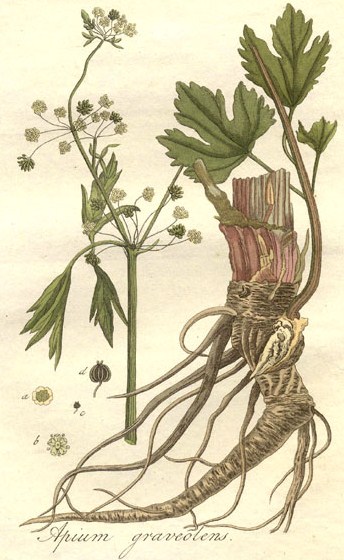Apium graveolens (L)
 Synonyms and Common names: Apii fructus, celery fruit, celery
seed, smallage
Synonyms and Common names: Apii fructus, celery fruit, celery
seed, smallage
Chinese = Qincai or Han-ch�in, French = Ache, German = Sellerie, Spanish = Apio, Italian = Sedano
Order: Umbelliferae/Apiaceae
Description: Apium is a strong-smelling, slender, erect biennial herb, up to 60cm tall, indigenous to Europe, the US, Asia and Africa in coastal areas, and extensively cultivated in the temperate regions of Europe and North America. It has shiny pinnate leaves and large toothed leaflets, the upper trifoliate and unstalked. The flowers are white, in four to twelve simple umbels in a compound umbel which is often opposite a leaf; there are no upper or lower bracts. The petals are small and entire with a small inflected point, and the fruits are very small and slightly compressed laterally. The flowering period is from June to August. There are several cultivated varieties which emphasise the size of the ribbed stem, and all varieties have medicinal properties.
Parts used: dried ripe fruit, aerial parts
Collection: The seed is collected when ripe in September, the herb at any time during the growing season.
Constituents: 1.5-3% volatile oil (containing the terpenes limonene and b-selinene, and phthalides); coumarins (seselin, osthenol, apigravin, celerin, umbelliferone); furanocoumarins (including bergapten), flavonoids (apigenin, apiin), phenolic compounds, choline, ascorbate, fixed oil, fatty acids and unidentified alkaloids.
Actions: mild diuretic, mild spasmolytic, carminative, anti-inflammatory, antirheumatic, sedative, hypotensive, urinary antiseptic, reputed aphrodisiac.
Indications: rheumatism, arthritis, gout, inflammation of the urinary tract. Specifically indicated in rheumatoid arthritis.
Therapeutics and Pharmacology: Apium is known as a mild diuretic and urinary antiseptic and has been used in the treatment of urinary calculi. It has a calming effect on the gut, and can be used in the relief of flatulence and griping pains. However, whilst it can reduce visceral spasm, it conversely stimulates the smooth muscle of the womb and can bring on delayed menstruation. After childbirth it helps the uterus readjust and encourages the flow of breast milk. The phthalides are the constituents responsible for the antispasmodic, sedative and diuretic actions. Apium has a direct action on the kidneys, increasing the elimination of water and speeding up the clearance of accumulated toxins from the joints and so is of benefit in any oedematous condition that accompanies arthritis. It is often administered with Taraxacum radix to increase the efficiency of elimination by both the kidneys and the liver. Apium is also hypoglycaemic, and as such is helpful in diabetes; this action seems to involve a direct action on the pancreas and its production of insulin. Clinical studies in China have demonstrated a hypotensive action for the tincture, and this is accompanied by increased urine output. The flavonoid apigenin has exhibited significant anti-platelet activity in vitro.
The volatile oil in Apium has been shown to have antifungal activity, and it is active against many bacteria including Staphylococcus aureus, Staphylococcus albus, Shigella dysenteriae, Salmonella typhi, Streptococcus faecalis, Streptococcus pyogenes and Pseudomonas solanacearum. No activity was observed against Escherichia coli or Pseudomonas aeruginosa.
Combinations: Apium combines well with Menyanthes and/or Guaiacum in rheumatic disease. The therapeutic action of Apium is potentiated by Taraxacum.
Caution: Apium should be avoided in pregnancy because it is a uterine stimulant. The volatile oil in quantity is toxic to the kidneys and so should not be used in kidney disorders. Allergic reactions are rare.
Preparation and Dosage: (thrice daily)
GSL Schedule 1
Dried fruits: 0.5-3g or by 1:5 decoction
Tincture: 1:5 in 90% alcohol, 2-8ml
Liquid Extract: 1:1 in 90% alcohol, 0.5-2ml
Additional Comments: In Germany, celery preparations are used to treat loss of appetite loss and exhaustion, and also in the prophylaxis of nervous exhaustion.
Bibliography
Bartram, T. 1995 Encyclopedia of Herbal Medicine, 1st edn.,Grace Publishers, Bournemouth.
Bradley, P.R. (ed.) 1992 British Herbal Compendium, Volume 1, BHMA, Bournemouth.
Bremness, L. 1994 Herbs, Dorling Kindersley Eyewitness Handbook, London.
BHMA 1983 British Herbal Pharmacopoeia, BHMA, Bournemouth.
Chevallier, A. 1996 The Encyclopedia of Medicinal Plants, Dorling Kindersley, London.
Hoffmann, D. 1990 The New Holistic Herbal, Second Edition, Element, Shaftesbury.
Hyperhealth 1996 Natural Health and Nutrition Databank, v.96.1 CD-ROM, �In-Tele-Health, available from Healthworks, Leeds. ISBN 0-646-30942-0
Lust, J. 1990 The Herb Book, Bantam, London.
Newall, C.A., Anderson, L.A., & Phillipson, J.D. 1996 Herbal Medicines: A Guide for Health-care Professionals, The Pharmaceutical Press, London.
Ody, P. 1993 The Herb Society's Complete Medicinal Herbal, Dorling Kindersley, London.
Press, B. & Gibbons, B. 1993 Wild Flowers of Britain and Europe: Photographic Field Guide, New Holland Publishers, London.
Wren, R.C. 1988 Potter's New Cyclopaedia of Botanical Drugs and Preparations, C.W.Daniel, Saffron Walden.










